How to Avoid Contributing to Overtourism – 11 Ways
‘Overtourism’ is a bit of a buzzword in the travel community at the minute. I recently attended the Traverse Travel Blogging Conference in Italy and a panel discussion on the final day focused largely on overtourism and what we, as travel influencers, should be doing to combat it.
As people in the travel industry, often working with tourism boards and making money from affiliate sales on tours, accommodation etc., we make a living from inspiring and convincing people to travel. And there is nothing wrong with that.
That is, until overtourism becomes an issue.

How to Avoid Contributing to Overtourism
What is Overtourism?
Overtourism describes the phenomenon of too many tourists visiting a given destination, which reduces quality of life for locals. With every man and his dog travelling these days (there are currently 2 billion tourist arrivals every year) and travel influencers promoting the same destinations (Bali, Venice, Barcelona etc.), places that have always been popular are seeing an even bigger surge in tourism that they are simply not equipped to deal with.
This often leads to resentment from locals, and in some places, locals have even taken to spray painting ‘tourists go home’ on the walls of their cities and marching in the street as protest to mass tourism.
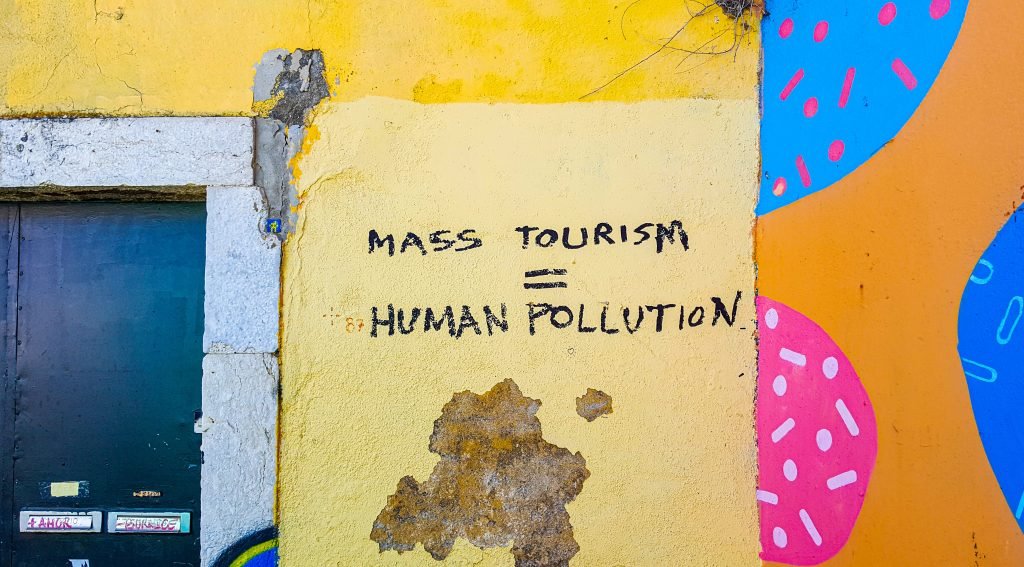
Why is Overtourism So Bad?
For many, the concept of ‘overtourism’ is unclear. Many people consider tourism to be good, and they’re partly right – tourism creates jobs, attracts investment and drives infrastructure.
However, there is such a thing as too much tourism, and that is when we begin to see the negative effects of overtourism. Some of these effects include:
Overpriced housing
With companies such as Airbnb selling short term rentals at a much higher cost than what a local person would pay per month, rental prices on the whole are increasing in certain cities. This is because a landlord would much rather sell a short term rental to a tourist and make – say – €80 per night, than rent to a local long term and make €300-400 per month for the same apartment.
In cities such as Venice, local people simply cannot afford to live there anymore, and so almost all city centre apartments are Airbnbs that cater exclusively to tourists.
Overpriced living
It is no secret that popular destinations are expensive, largely because businesses can charge whatever they want, knowing that tourists will still pay. In poorer countries, this can be detrimental to the local quality of life.
For example, in Kotor, Montenegro (somewhere that isn’t suffering as much as Venice but is still beginning to see some negative effects of overtourism), a pint of beer costs up to €4 with a pasta dish in a restaurant being anywhere from €12-17. This doesn’t sound too bad, but when you consider that the average local salary is just a couple of hundred euros a month, Kotor suddenly seems like a very expensive place to live.
Congested streets and public transport
Believe it or not, local people in touristy cities still have real lives to lead. They still have to take the bus to work each morning, and this can be made impossible by queues of hundreds of tourists getting ready for their day of sightseeing.
What’s more, even walking to work can be difficult when the streets are choc-full of tourists bumping into one another, waving selfie sticks and stopping randomly to gaze up at the buildings around them. When I lived in Kotor, a 100m journey would take me up to 10 minutes because I was constantly getting stuck behind huge tour groups that were oblivious to my existence.
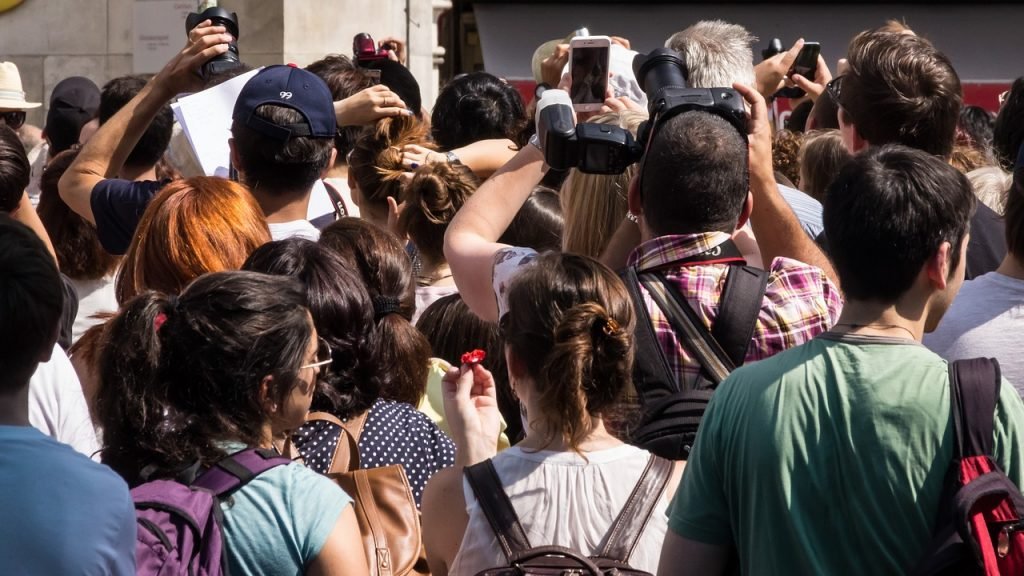
Excessive trash
There is a certain country whose tourists are known for leaving trash everywhere, but just because that country may be the worst offender doesn’t mean that almost every tourist hasn’t been guilty of this.
When I worked on a small island off the coast of Cambodia, the amount of plastic cups that tourists would just toss into the sea was astounding. Every single day, thousands of these cups would wash up onto the shores on the mainland, and the only place they could possibly be coming from was our island.
If you take a walk on any beach in Thailand early in the morning you wouldn’t believe the mess that people have left from their partying the night before. For some reason, when visiting a new place, people think nothing of leaving a trail of destruction in their wake.
How Can We Combat Overtourism?
Fortunately, there are many ways that we can help to combat overtourism. I have always been a big advocate on this blog of travelling to lesser-known places such as Ukraine, Moldova and Albania, but I understand that for many people, those countries can seem a little too intimidating for them.
Many of the popular places such as Paris, Barcelona and Rome are popular for a reason, and I don’t want to sit here and tell you not to go, or judge you because you want to live your lifelong dream of riding a gondola in Venice. I don’t want to necessarily promote those destinations on this blog, but if you’re going to go anyway then you’re going to go, and I probably can’t stop you.
What I can do, however, is give you some advice on how to travel to popular destinations without having too much of a negative impact on them. There are so many things we can do to become a more responsible tourist and lessen our impact on the places we visit, and so if you want to know more then just keep reading!
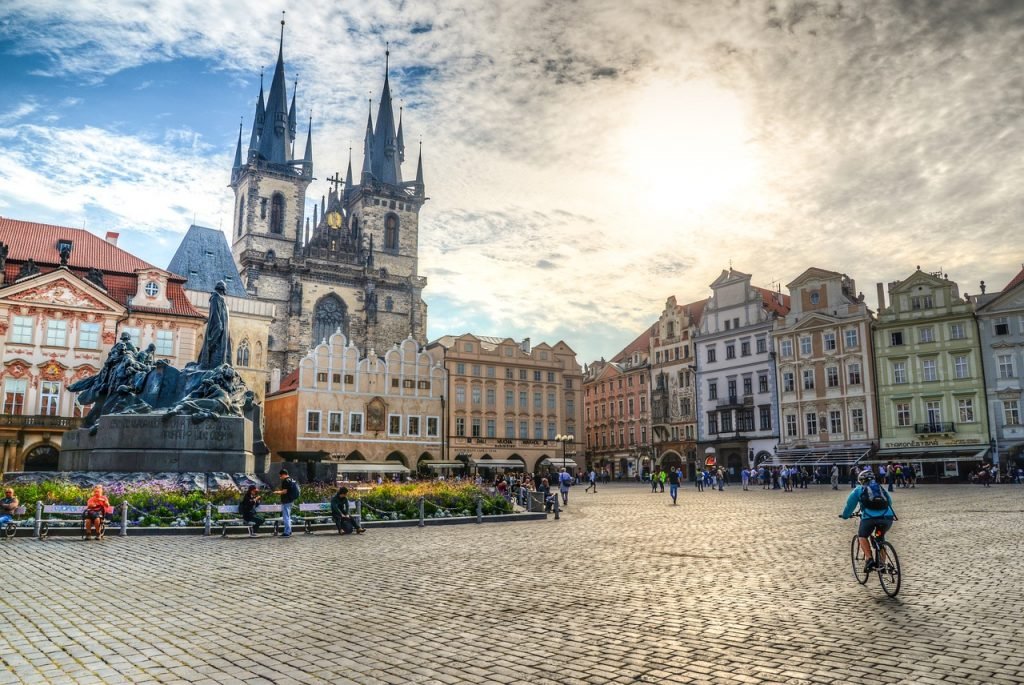
IMG: Pixabay
1. Stay longer in places
So I know that this sounds a bit counterintuitive but stay with me on this – if you only spend a day (or even just an afternoon) in a place then not only are you not going to be spending much money there and contributing to the local economy, but you are also going to be rushing from place to place in a bid to cram everything in in as little time as possible.
This is hugely annoying for locals who are just trying to go about their daily business. If you actually spend longer in a place then not only are you going to contribute more to that place financially, but you will also be able to take things at a slower place and visit those major landmarks when there are less crowds (for example early in the morning or in the evening, after most day trippers have left).
We live in a bucket list culture, where we are so busy rushing to tick things off a list that we don’t truly get to experience the places that we visit. Sure, you can ‘see’ the main sights of Pisa in just a few minutes, but if you stay in Pisa for a few days then you will manage to escape the selfie sticks and hordes of tourists and find out where to buy the best ice cream, what the nightlife is like, where the best restaurants are and where the locals actually hang out.
In my opinion, this is infinitely more valuable than just whizzing from one monument to the next, both for you as a tourist and also for the wellbeing of the destination as a whole.
If you really want to experience a place fully, you could consider staying for a few months by finding a job, volunteer opportunity or internship. For example, fashion internships in Barcelona allow you to further your career in fashion whilst living it up in one of the best cities in the world!
2. Visit in shoulder season
Visiting in shoulder season has SO many benefits! First of all, you will save a tonne of money as flights and accommodation are always cheaper in the shoulder season (by ‘shoulder season’ I mean the couple of months surrounding ‘high season’ which would be July and August in Europe). Not only that, but destinations are much less crowded, meaning that you don’t have to wait in line for hours to see popular attractions, and you won’t be fighting for space to take a photograph.
As far as benefiting the destination itself, travelling in shoulder season brings money to a city at a time when the locals actually need it, and if just 10% of people that usually travel in high season decide to travel in shoulder season instead, then it takes a lot of pressure off the city in the summer months.
3. Explore with local tour guides
When you experience a city with a local tour guide, not only do you get tonnes of information about a place from somebody that is both passionate and qualified, but the money you spend actually trickles down into the local economy. I always use local guides, whether it’s for ‘free’ (tip based) walking tours, or private tours.
If you are part of a tour with a huge company such as Contiki, your guides are going to be reading information off a laminated sheet and the destination itself won’t see much (if any) of the money that you have spent on the tour.
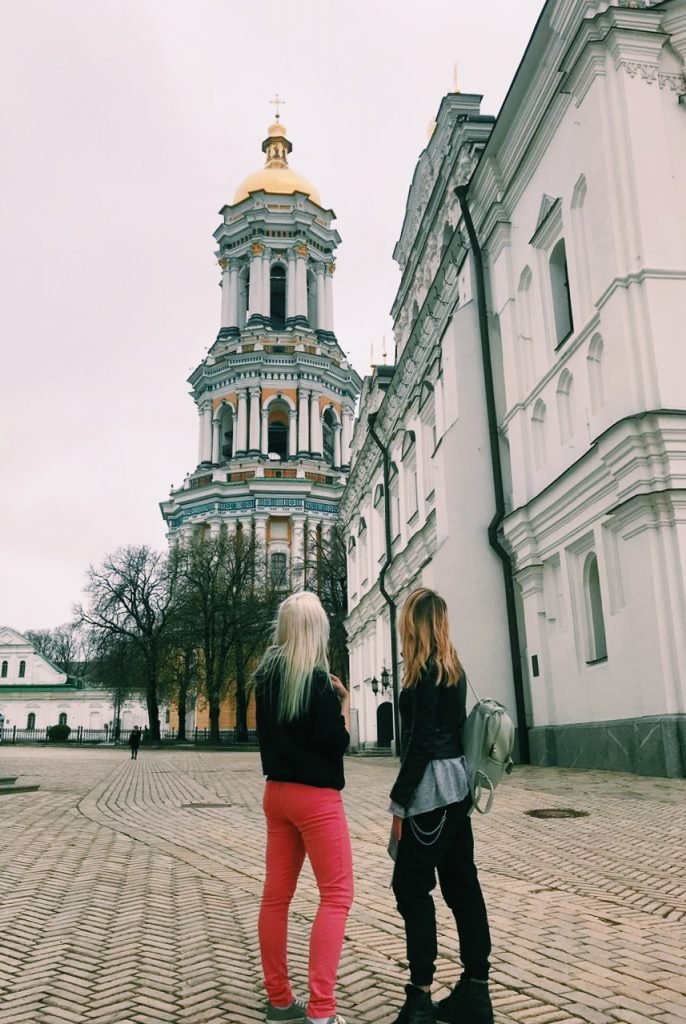
4. Spend money in local businesses
One surefire way of making sure that your money does not make its way to local communities is by spending it at places such as McDonalds, Starbucks, H&M etc. Sure, everybody craves a BigMac once in a while, but if you’re serious about helping curb the negative effects of overtourism, you’ll want to be spending your money at independently owned cafes, restaurants and shops.
Buying souvenirs from local artisans and frequenting local bistros not only supports small business, but the profits are also likely to stay within the community.
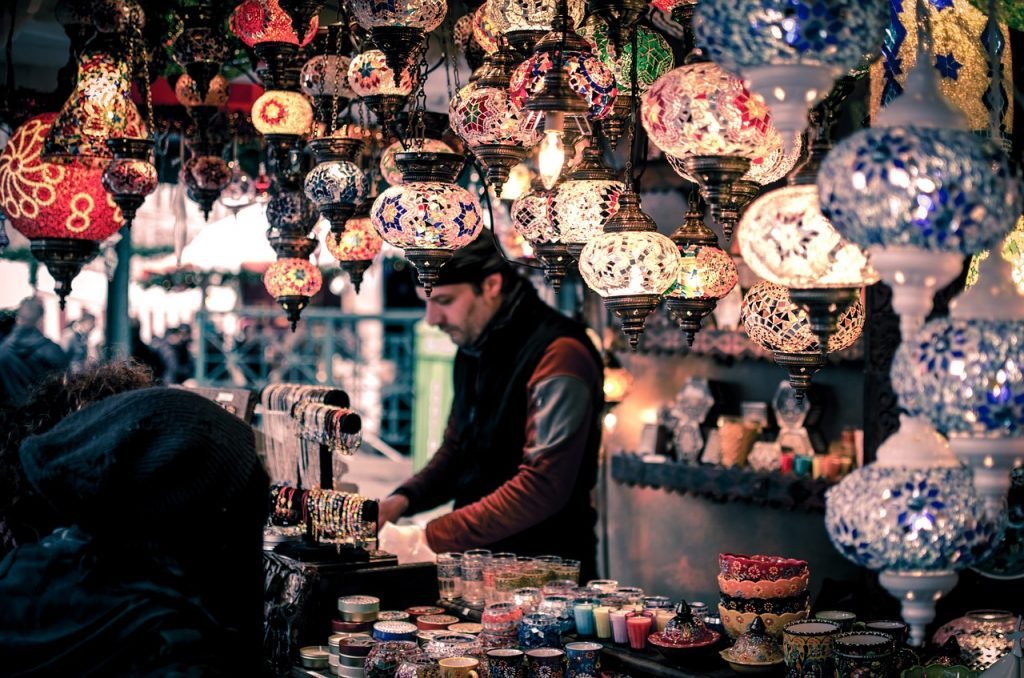
5. Avoid visiting as part of a cruise
I don’t like to shame the way that people travel. I understand that there is no ‘one size fits all’ approach when it comes to travel, and what may be for me may not necessarily be for you.
However, the problems with cruise ships are endless (although the cruise industry is beginning to change) and I could write 10 more articles about cruise ships alone (and I probably will), but from an overtourism standpoint, cruise ships are cancer.
Every day when I was living in the tiny walled city of Kotor in Montenegro, 4 huge cruise ships would arrive every single day and tens of thousands of people would descend on Kotor’s Old Town (which only has 961 inhabitants, so you can imagine how crowded it feels when the cruise ships arrive).
Because these people have already paid for their all-inclusive ship experience, none of them spend money in local bars and restaurants, and all that they really do is litter everywhere and clog the streets. Locals in Kotor are simply unable to go about their day to day lives due to these ships, and if you ask me, that’s a real shame.
Of course the real solution to this is for destinations to heavily restrict the amount of cruise ships that are allowed to visit on a given day, but something that we can do as tourists is not to support the cruise ship industry.
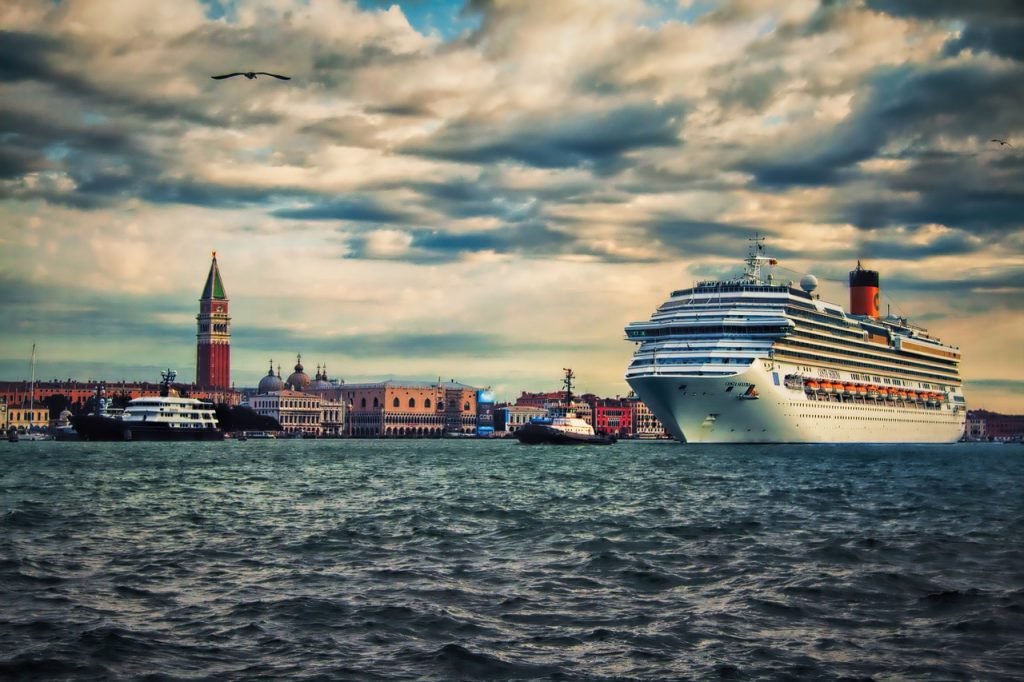
6. Respect the locals
Perhaps the biggest annoyance about overtourism is how oblivious tourists can be when exploring a place! I’ve lost track of the number of times I’ve walked smack bang into somebody who decided to randomly stop walking on a narrow street in order to gawp upwards or take a picture of something.
Of course I’m not saying that you shouldn’t take pictures, but it doesn’t hurt to be mindful of where you are and give some consideration to people that may be walking just behind you before you whack them with a selfie stick!
Another thing that should go without saying is don’t sneak onto private property in order to take pictures. I don’t care if you’re in Notting Hill or Santorini, trespassing onto private property just to get a nice Instagram picture is not okay.
Lastly, dress appropriately. Don’t wander into places of worship wearing miniskirts and using flash photography. Don’t sunbathe topless on beaches in Asia. Don’t walk around European city centres in your bikini or swimming trunks. It’s not rocket science guys.
7. Be mindful when choosing accommodation
If I told you to completely avoid Airbnb then I would be a hypocrite. While I mostly stay in hostels, every few months I’ll treat myself to a night or two in my own apartment, which I usually find on Airbnb.
However, Airbnb is something that you should use sparingly. Although the original concept of Airbnb – renting your spare room out to strangers – is great, what has actually happened is that huge businesses buy entire apartment blocks and put them all up for holiday rentals on Airbnb.
This pushes local people out of their own cities, and leaves cities like Venice almost deserted in the winter months, when the tourists have gone and there are thousands of apartments sitting vacant in the city centre.
Another way in which you can choose accommodation responsibly is by choosing somewhere in the city centre. This means that you won’t be clogging up public transport for people trying to commute into the city, and you won’t be disturbing a residential neighbourhood when you roll home drunk at 4am on a Wednesday.
It’s also good to stay in locally-owned hostels or guesthouses rather than huge international hotels because – you’ve guessed it – the money stays within the community that way.
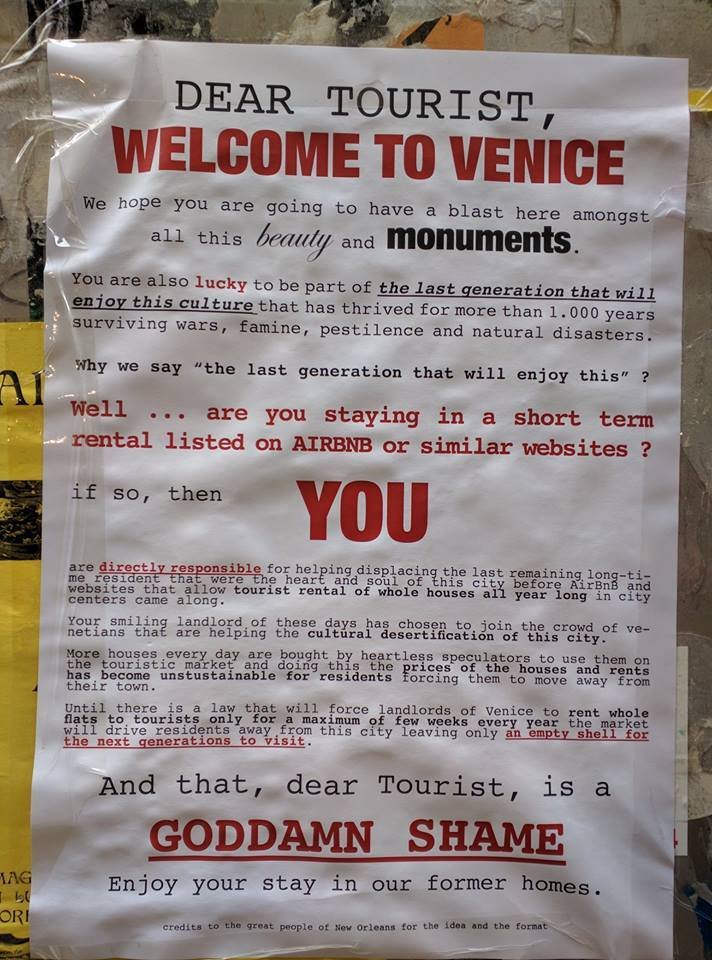
8. Respect the local environment
There are so many ways that you can respect the environment when travelling to popular destinations.
Carry a re-useable water bottle rather than buying plastic bottles every day, take a re-useable shopping bag with you to local markets, look into offsetting your carbon emissions when you fly, don’t litter, remember to turn off lights and A/C when leaving your hotel…the list goes on.
All of these things are very simple and easy to implement into our travels, but the truth is that most of us simply don’t think. However, think about how much better for the places we visit (and the planet as a whole!) if we just made a tiny effort to be a bit more eco friendly when we travel!
9. Travel for YOURSELF, not for the Gram
Be honest, do you want to go to that riad in Marrakech or that viewpoint in Bali because you actually want to go, or because you want to recreate a picture you saw on Instagram?
Do you actually want to see the balloons in Cappadocia at sunrise, or do you just feel as though you have to because you want some more followers on social media?
I spoke before about the ‘bucket list culture’ that we have, and I meant what I said – most of these ‘travel goals’ are not things that people actually want to do but things they feel they have to do, and that mentality is not only sad, but it’s also partly why we are seeing so much overtourism with the rise of social media platforms like Instagram.
Don’t travel for the Instagram pictures. Travel because something about that country interests you. Perhaps it’s the history, or the food, or the landscape. Perhaps it’s something else entirely. Or perhaps one of those big ‘bucket list’ destinations doesn’t appeal to you, and that’s totally fine!
On a recent trip to Naples, I decided against going to Pompeii. Most people would probably gasp in horror at hearing that, and wonder how I could possibly visit Naples and not see Pompeii, but truth be told, it just doesn’t interest me.
I have no desire to walk around for hours in the blistering heat, fighting my way through the crowds to see some archaeological ruins that ultimately, I’m not that bothered about. I chose to spend my time in Naples getting lost down random alleyways and eating pizza, and do you know what? #noregrets

10. Go off the beaten path in a city
Let’s say you desperately want to go to Venice. There’s nothing wrong with that – Venice is beautiful. But a very simple thing that you can do is to get off the beaten path while you’re actually in the city.
A wonderful organisation that makes this possible in Venice specifically is Venezia Autentica, a social enterprise that promotes responsible tourism and aims to support local businesses in the city of Venice by promoting the best local artisan shops, restaurants etc. Their website is a fantastic resource for anybody who wants to travel to Venice without hurting it, but if the destination you’re travelling to doesn’t have an equivalent then simply let your feet decide!
Wander down hidden side streets and check out the quieter piazzas. Not only will you take some of the strain off the main drag, but you will likely have a much more authentic experience away from the main tourist streets!
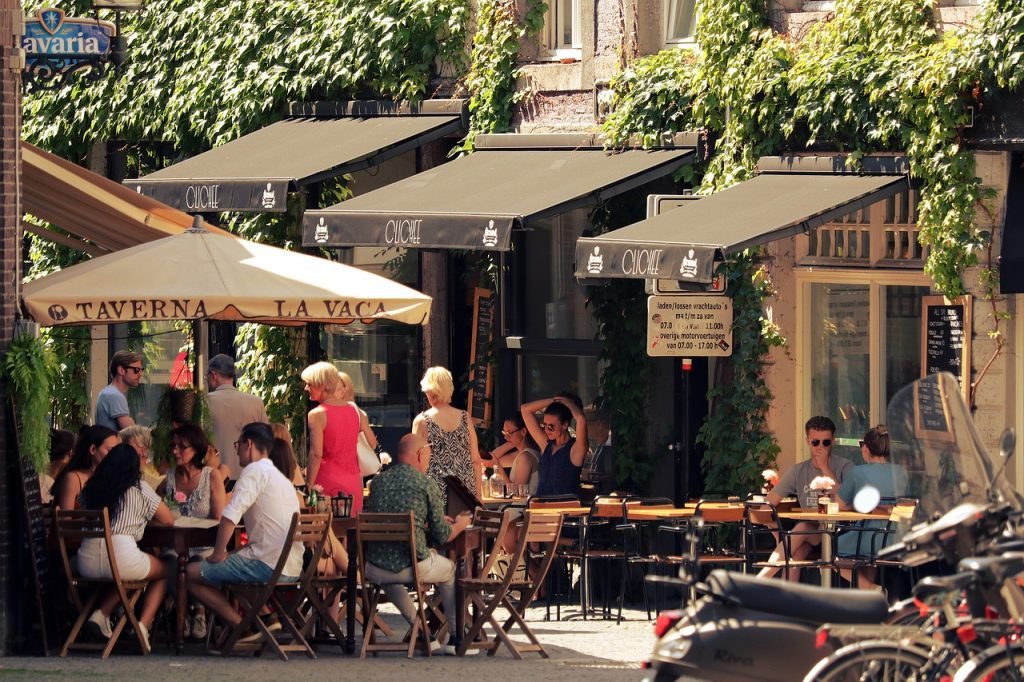
11. Go somewhere else!
Okay, so I know I said that this post was going to be about how to still visit your fave popular holiday spots, but I couldn’t leave without giving you the best piece of advice I have – just go somewhere else!
I’m not saying that you have to go somewhere totally off the grid – as much as I wax lyrical about the undiscovered beauty in the Balkans and Eastern Europe, I’m not against Western Europe at all!
I absolutely think that you should travel to Italy – it’s one of my favourite countries on the planet – but just consider going somewhere a little less touristy when planning your vacation.
While places like Venice are practically begging tourists not to visit, regions such as Trentino in the North are actively trying to get more tourists to come and see what they have to offer! If you don’t fancy hiking in the Dolomites then why not explore Tuscany, where there are so many small towns that are incredibly authentic and way more budget-friendly than the big cities (and even more beautiful!). You could also visit Sicily, which has so much to offer but lies undiscovered by the vast majority of people that visit Italy, or Puglia, which has dozens of stunning hill towns and hundreds of kilometres of gorgeous Mediterranean coastline.
It takes guts to go somewhere slightly less travelled – you may encounter people that don’t speak English and have to rely on Google Translate when looking at a restaurant menu, but if you can get past that then going somewhere other than the main tourist hot spots will not only give you a better, more authentic experience, but the bigger cities will thank you for it.
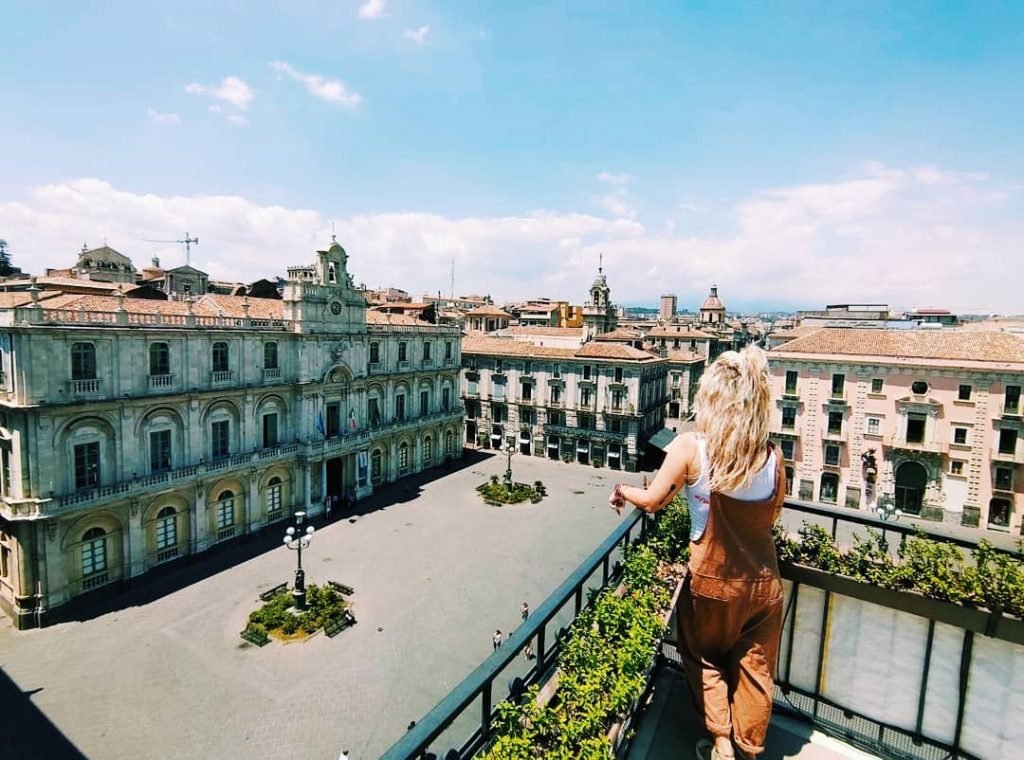
So, there concludes my list of 11 ways that you can lessen the negative impact of overtourism while still visiting your favourite destinations! Did I miss anything? Please let me know in the comments section below, and let me know how YOU travel responsibly!
If you liked this article and would like to support my work, please click the button above to donate a couple of bucks and buy me a coffee. The ad revenue that I receive on this website is minimal, so support from my readers enables me to keep creating content that you (hopefully!) love to read.

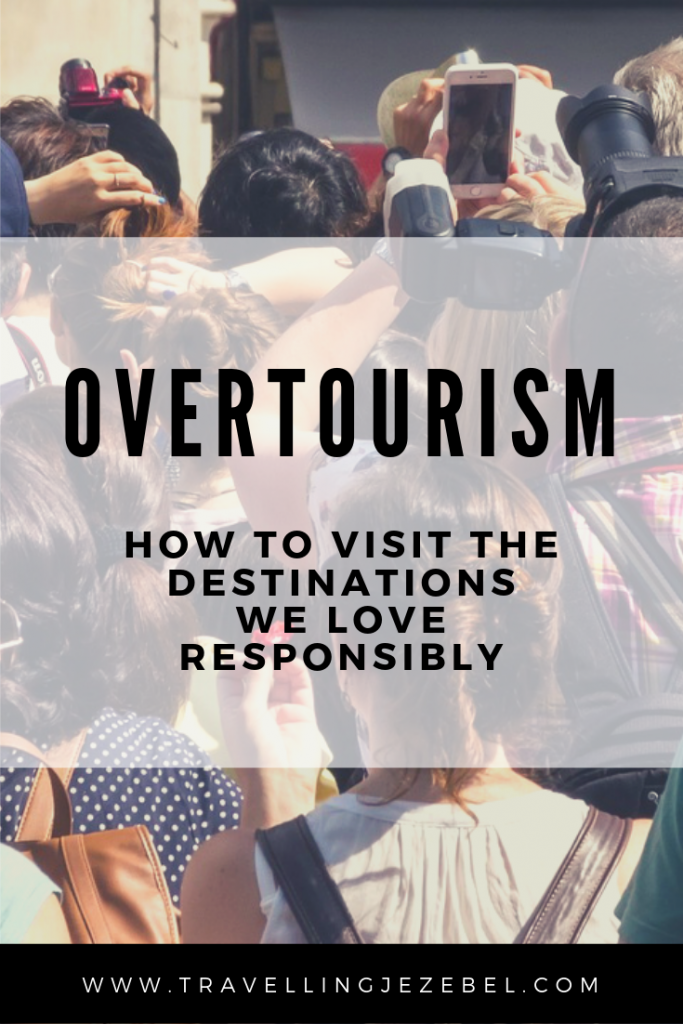
Disclaimer: This page contains affiliate links. If you make a purchase on a recommended site, I may earn a commission at no extra cost to you.

This is such an important topic and you explained soooo well why overtourism is bad! I completely agree with the cruises… I absolutely hate them to be honest, they’re so polluting and I can’t think of anything more boring haha! I have seen how overtourism is affecting Hallstatt in Austria and they are going to allow a certain amount of buses to come every day so that they can limit overtourism. Thank you so much for writing about this subject and spreading awareness!
I love this post, Dani! I too have written about overtourism and recently about Airbnb. I so agree with you on all of this. As a travel planner, I encourage my clients to visit off the beaten path places but it’s difficult with Americans. So what I do is visit these places, photograph them and write about them and hope that folks say, “I want to go there too.” Then I can get them to visit these lesser visited spots. By the way, I’m a huge fan of the Alto Adige region of Italy and recently visited the Piedmont region which is not nearly as busy as Tuscany and might be more beautiful! And everyone can have Lake Bled in Slovenia. I’ll take Bohinj!
Great post! I had heard of overtourism but didn’t really understand it’s full effects until I saw it first hand when we went to Santorini.
I love the way you addressed this. Instead of telling people not to visit these places (they are popular for a reason!), you give good advice for helping combat overtourism while still being able to visit the places you’ve dreamed of visiting. Thank you for putting this out there!
I love your post! I try to travel (and promote) underrated destinations now – also because I happen to prefer them myself. Your article is sooo important to consider when traveling. Thanks for writing <3
Interesting read. Definitely gave some perspective on overtourism. There’s definitely some places that are experiencing this that are on my list of places to visit, but I will keep in mind your suggestions on how to really contribute to these communities.
Thank you 🙂 yeah, I definitely don’t think we need to stop visiting those places completely but there are certainly ways that we can travel that help the communities more!
I found myself nodding along the whole way through this post. I agree with everything you’ve said.
There are a few places that i used to want to visit, where I have changed my plans once I found out how crazy they are becoming. For example this summer we were planning to hike the Camino de Santiago, but we swapped our plans and explored lesser-known trails in the Pyrenees. I am SO glad we did. They trails were not crowded but they were ridiculously beautiful.
P.s. I sometimes find it difficult in travel groups on facebook when I need to promote a post about cruise ships. like you, I find the whole industry incredibly problematic, but I don’t want to be a bitch and not share a post when i am obliged to. Le sigh.
That’s the beauty of exploring alternative places, you get to see some real hidden gems!
I totally agree with the Facebook group thing. There are a number of topics (cruises being one of them) that I just can’t bring myself to share. Usually if I am obliged to share that person’s content then I will try and find another post on their site that I don’t mind promoting!
Yes yes yes to all of this. When I’m travelling abroad with my children, I purposely go out of the way and avoid all “tourist” hot spots. Yes we’ve been to Paris and Barcelona but we’ve also been to the countryside and immersed in the culture. I think other families should do that too and steer clear of the Instagram Tourism.
100%, and exploring those lesser known places will be amazing for your kids as well!
I love this post and this topic cannot be talked about enough. It is really sad to see how much overtoursim is ruining the experience for everyone especially the locals. Tourists often forget that real people live, work and play in those same areas that are being overrun by outsiders. Travel is incredible and very powerful if done right.
1000%, living in Kotor and seeing that the local people can’t afford to even eat in local restaurants or go about their daily lives as normal was so sad and infuriating to me!
Great tips! I love your tip to travel for yourself, not the gram. My husband and I definitely live by this. We do what we want and avoid the overcrowded spots that we aren’t interested in. It’s sad when tourism is a problem for the locals, so I love your tips regarding making sure you put money back into the places you visit.
Yep, I’ve been in Italy for 5 months now and I’ve never been to Rome, Florence or Venice! People usually can’t believe that but the truth is that I just have no desire to go to those places (especially in the height of summer!). Instagram travel is the worst, haha.
I tend to travel mostly to places that would not feature on instagram. My most recent destinations were Lebanon and Ethiopia where people breathed a sigh of relief and pleasure that a tourist is comming their way.
I have also been to Venice, Paris etc and like those destinations too but think there really has to be a better way to handle things than putting up signs saying things like “Go home tourist”. How mean is that when people have saved up and carved out some time to finally see a place they have heard so much about and seen so many beautiful photos of. There is something special about going to a place and marvelling that the things in the photos really do exist and you are now standing beside them.
But, I would just find it off putting if I anticipated being told I am a misery by a local person just because I accidentally stood in their way.
My home is beside one of Europes most famous tourist attractions as one would almost expect of somebody who loves to travel, and I can’t imagine ever telling a tourist to go home.
Yes, I totally agree that the graffiti telling tourists to go home is uncalled for – I would be upset if I saw something like that as well. Very jealous that you have been to Lebanon and Ethiopia!!!
This. Absolutely this. I’ve come to terms with the fact that there are places I’ve always wanted to visit that I’ll never see because going there would simply be unsustainable for the locals, the environment, and me. I did a group tour once and hated it with the fire of a thousand suns because ultimately, I am not a group person, I really dislike crowds, and seeing one person litter is enough to have me in a bad mood for the rest of the day. So I’m not just going, and while I thought it would make me sad to take some destinations off of my list, I am actually relieved.
Couldn’t have said it better myself!